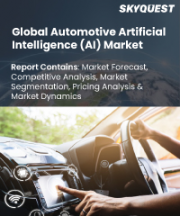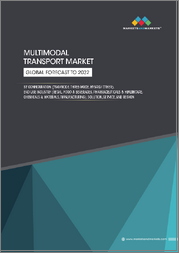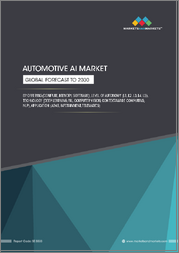
|
시장보고서
상품코드
1899596
차량용 인공지능(AI) 시장 규모, 점유율, 성장 분석 : 컴포넌트별, 기술별, 프로세스별, 유형별, 차량 유형별, 자율성 레벨별, 용도별, 지역별 - 업계 예측(2026-2033년)Automotive Artificial Intelligence (AI) Market Size, Share, and Growth Analysis, By Component, By Technology, By Process, By Type, By Vehicle Type, By Level of Autonomy, By Application, By Region - Industry Forecast 2026-2033 |
||||||
세계의 차량용 인공지능(AI) 시장 규모는 2024년에 50억 달러로 평가되었고, 2025년 61억 달러에서 2033년까지 297억 2,000만 달러로 성장할 전망이며, 예측 기간(2026-2033년) CAGR은 21.9%를 보일 것으로 예측됩니다.
세계 차량용 인공지능(AI) 시장은 언어 처리, 추론, 학습 등 인간과 같은 능력을 강화하는 첨단 기술의 필요성으로 인해 괄목할 만한 성장을 거듭하고 있습니다. 심각한 과학적 문제에 직면하고 있음에도 불구하고 각 제조업체는 혁신의 개선과 적응을 위해 적극적으로 노력하고 있습니다. 자동차 업계는 AI의 혁신적 가능성을 인식하고 프로세스 최적화, 안전 및 효율성 향상을 위한 기술 활용에 있어 선도적인 입지를 구축하고 있습니다. AI의 통합은 업무 효율성뿐만 아니라 사용자 경험 향상에도 기여하며, 자동차 산업의 미래를 형성하는 데 있어 인공지능의 중요한 역할을 강조하고 있습니다. 산업이 진화하는 가운데, AI는 인간과 기계의 지능의 격차를 해소하는 게임 체인저가 될 것으로 기대되고 있습니다.
세계 차량용 인공지능(AI) 시장 성장 촉진요인
세계 차량용 인공지능(AI) 시장은 기술 발전에 대한 소비자의 지식이 높아짐에 따라 견조한 성장세를 보이고 있습니다. 자율주행차에 대한 관심이 높아지면서 첨단운전자보조시스템(ADAS)에 대한 수요가 증가하고 있으며, 자동차 제조업체들은 차량 성능 및 안전성 향상을 위한 혁신을 요구받고 있습니다. 또한, 승객의 편안함과 적응성에 대한 집중이 이 분야의 수익 성장을 주도하고 있습니다. 각 제조업체들이 운전 경험을 혁신하기 위해 AI 통합을 우선순위에 두고 있기 때문입니다. 이러한 첨단 기술로의 전환은 보다 스마트하고 안전하며 효율적인 차량을 지향하는 광범위한 추세를 반영하며, AI가 자동차 산업에서 중요한 구성 요소로 자리 잡게 될 것임을 확고히 하고 있습니다.
세계 차량용 인공지능(AI) 시장 성장 억제요인
세계 차량용 인공지능(AI) 시장은 성장 잠재력을 저해하는 몇 가지 중대한 문제에 직면해 있습니다. 안전과 보안에 대한 우려가 주요 리스크 요인으로 작용하고 있으며, 특히 개인 데이터 보호와 사이버 공격에 대한 취약성이 문제시되고 있습니다. 예를 들어, 소프트웨어 취약점으로 인해 피아트 크라이슬러 차량의 기능이 다수 침해된 사례, 악의적인 프로그래머가 테슬라 자동차 시스템에 악성코드를 심어놓은 사례 등 주요 제조업체와 관련된 사례들이 이러한 문제점을 잘 보여주고 있습니다. 이러한 소비자 보안 침해 사례는 강화된 보호 조치와 프로토콜의 필요성을 강조하고 있으며, 궁극적으로 자동차 분야의 AI 기술 발전과 보급 확대에 큰 장벽이 되고 있습니다.
세계 차량용 인공지능(AI) 시장 동향
세계 차량용 인공지능(AI) 시장은 자율주행 기술에 대한 소비자의 수용성 향상과 도로 안전에 대한 중요성 증가를 원동력으로 하여 뚜렷한 상승세를 보이고 있습니다. 첨단운전자보조시스템(ADAS)에 대한 선호도가 변화하는 가운데, 운전 관련 스트레스 감소와 편의성 향상을 원하는 소비자의 의향을 반영하여 자율주행차에 대한 수요는 급증할 것으로 예측됩니다. 자동차 제조업체들은 경쟁 구도에서 차별화를 위해 혁신적인 AI 솔루션을 통합하는 전략적 대응을 추진하고 있습니다. 또한, 증가하는 모빌리티 니즈와 운전 경험 향상에 대한 추구의 결합은 자동차 분야에서 AI의 중요한 역할을 더욱 확고히 하고 있으며, 이는 시장의 견고한 성장 전망을 보여주고 있습니다.
자주 묻는 질문
목차
서론
- 조사 목적
- 조사 범위
- 정의
조사 방법
- 정보 조달
- 2차와 1차 데이터 방법
- 시장 규모 예측
- 시장 전제조건과 제한
주요 요약
- 세계 시장 전망
- 공급과 수요 동향 분석
- 부문별 기회 분석
시장 역학과 전망
- 시장 규모
- 시장 역학
- 성장 촉진요인과 기회
- 성장 억제요인과 과제
- Porter의 Five Forces 분석
주요 시장 인사이트
- 중요 성공 요인
- 경쟁 정도
- 주요 투자 기회
- 시장 생태계
- 시장의 매력 지수(2025년)
- PESTEL 분석
- 거시경제 지표
- 밸류체인 분석
- 가격 분석
- 규제 상황
- 사례 연구
- 기술적 진보
세계의 차량용 인공지능(AI) 시장 규모 : 컴포넌트별&CAGR(2026-2033)
- 하드웨어
- 소프트웨어
세계의 차량용 인공지능(AI) 시장 규모 : 기술별&CAGR(2026-2033)
- 딥러닝
- 머신러닝
- 상황인식 컴퓨팅
- 컴퓨터 비전
- 자연언어처리
- 기타
세계의 차량용 인공지능(AI) 시장 규모 : 프로세스별&CAGR(2026-2033)
- 신호 인식
- 영상 인식
- 데이터 마이닝
세계의 차량용 인공지능(AI) 시장 규모 : 유형별&CAGR(2026-2033)
- 그래픽스 처리 장비(GPU)
- 마이크로프로세서(ASIC 포함)
- 필드 프로그래머블 게이트 어레이(FPGA)
- 메모리 및 스토리지 시스템
- 이미지 센서
- 생체인식 스캐너
- 기타
세계의 차량용 인공지능(AI) 시장 규모 : 차량 유형별&CAGR(2026-2033)
- 승용차
- 상용차
세계의 차량용 인공지능(AI) 시장 규모 : 자율 레벨별&CAGR(2026-2033)
- 레벨 1
- 레벨 2
- 레벨 3
- 레벨 4
세계의 차량용 인공지능(AI) 시장 규모 : 용도별&CAGR(2026-2033)
- 휴먼 머신 인터페이스
- 준자율주행
- 자율주행
- 본인 인증
- 운전자 모니터링
- 자율주행 프로세서 칩
- 기타
세계의 차량용 인공지능(AI) 시장 규모&CAGR(2026-2033)
- 북미
- 미국
- 캐나다
- 유럽
- 독일
- 스페인
- 프랑스
- 영국
- 이탈리아
- 기타 유럽
- 아시아태평양
- 중국
- 인도
- 일본
- 한국
- 기타 아시아태평양
- 라틴아메리카
- 브라질
- 기타 라틴아메리카
- 중동 및 아프리카
- GCC 국가
- 남아프리카공화국
- 기타 중동 및 아프리카
경쟁 정보
- 주요 5개사 비교
- 주요 기업의 시장 포지셔닝(2025년)
- 주요 시장 기업이 채택한 전략
- 최근 시장 동향
- 기업의 시장 점유율 분석(2025년)
- 주요 기업 개요
- 기업 상세
- 제품 포트폴리오 분석
- 기업 부문별 점유율 분석
- 매출 전년대비 비교(2023-2025년)
주요 기업 개요
- Tesla Inc.(United States)
- Waymo LLC(United States)
- Nvidia Corporation(United States)
- Intel Corporation(United States)
- DiDi Chuxing Technology Co.(China)
- Uber Technologies Inc.(United States)
- Horizon Robotics Inc.(China)
- AEye Inc.(United States)
- Arbe Robotics Ltd.(Israel)
- Cerence Inc.(United States)
- Cognata Ltd.(Israel)
- Optibus Ltd.(Israel)
- Pony.ai Inc.(United States)
- Seeing Machines Ltd.(Australia)
- UVeye Ltd.(Israel)
- Scale AI Inc.(United States)
- XPeng Inc.(China)
- NIO Inc.(China)
- WeRide.ai(China)
- AutoX Inc.(United States)
결론과 제안
LSH 26.01.14Global Automotive Artificial Intelligence (AI) Market size was valued at USD 5.0 Billion in 2024 and is poised to grow from USD 6.1 Billion in 2025 to USD 29.72 Billion by 2033, growing at a CAGR of 21.9% during the forecast period (2026-2033).
The Global Automotive Artificial Intelligence (AI) market is experiencing significant growth driven by the need for advanced technologies that enhance human-like capabilities such as language processing, reasoning, and learning. Despite facing substantial scientific challenges, manufacturers are actively working to improve and adapt their innovations. The automotive sector recognizes the transformative potential of AI, positioning itself as a leader in leveraging these technologies to optimize processes and improve safety and efficiency. This integration of AI not only streamlines operations but also enhances the user experience, underlining the critical role that artificial intelligence plays in shaping the future of the automotive industry. As the sector evolves, AI promises to be a game-changer, bridging the gap between human and machine intelligence.
Top-down and bottom-up approaches were used to estimate and validate the size of the Global Automotive Artificial Intelligence (AI) market and to estimate the size of various other dependent submarkets. The research methodology used to estimate the market size includes the following details: The key players in the market were identified through secondary research, and their market shares in the respective regions were determined through primary and secondary research. This entire procedure includes the study of the annual and financial reports of the top market players and extensive interviews for key insights from industry leaders such as CEOs, VPs, directors, and marketing executives. All percentage shares split, and breakdowns were determined using secondary sources and verified through Primary sources. All possible parameters that affect the markets covered in this research study have been accounted for, viewed in extensive detail, verified through primary research, and analyzed to get the final quantitative and qualitative data.
Global Automotive Artificial Intelligence (AI) Market Segments Analysis
Global Automotive Artificial Intelligence (AI) Market is segmented by Component, Technology, Process, Type, Vehicle Type, Level of Autonomy, Application and region. Based on Component, the market is segmented into Hardware and Software. Based on Technology, the market is segmented into Deep Learning, Machine Learning, Context- aware Computing, Computer Vision, Natural Language Processing and Others. Based on Process, the market is segmented into Signal Recognition, Image Recognition and Data Mining. Based on Type, the market is segmented into Graphics processing unit (GPU), Microprocessors (Incl. ASIC), Field Programmable Gate Array (FPGA), Memory and Storage systems, Image Sensors, Biometric Scanners and Others. Based on Vehicle Type, the market is segmented into Passenger Vehicles and Commercial Vehicles. Based on Level of Autonomy, the market is segmented into Level 1, Level 2, Level 3 and Level 4. Based on Application, the market is segmented into Human-Machine Interface, Semi-autonomous Driving, Autonomous Driving, Identity Authentication, Driver Monitoring, Autonomous Driving Processor Chips and Others. Based on region, the market is segmented into North America, Europe, Asia Pacific, Latin America and Middle East & Africa.
Driver of the Global Automotive Artificial Intelligence (AI) Market
The Global Automotive Artificial Intelligence (AI) market is experiencing robust growth driven by consumers who are increasingly informed about technological advancements. The rising interest in self-driving vehicles fuels demand for advanced driver assistance systems, prompting automakers to innovate by enhancing vehicle performance and safety. Additionally, the focus on passenger comfort and adaptability is driving revenue growth within the sector, as manufacturers prioritize the integration of AI to transform the driving experience. This shift towards sophisticated technology reflects a broader trend towards smarter, safer, and more efficient vehicles, solidifying the role of AI as a critical component in the automotive industry.
Restraints in the Global Automotive Artificial Intelligence (AI) Market
The Global Automotive Artificial Intelligence (AI) market faces several significant challenges that impede its growth potential. Safety and security concerns pose major risks, particularly regarding the protection of personal data and vulnerabilities to cyberattacks. Incidents involving major manufacturers highlight these issues, such as the compromise of functionality in numerous Fiat Chrysler vehicles due to software vulnerabilities, and the infiltration of malware into Tesla car systems by malicious programmers. Such breaches in consumer security underscore the critical need for enhanced safeguards and protocols, ultimately serving as substantial barriers to the advancement and wider adoption of AI technologies within the automotive sector.
Market Trends of the Global Automotive Artificial Intelligence (AI) Market
The Global Automotive Artificial Intelligence (AI) market is experiencing a significant upward trend driven by heightened consumer acceptance of self-driving technologies and an increasing emphasis on road safety. As preferences shift towards advanced driver-assist systems, demand for self-driving vehicles is poised to surge, reflecting consumers' desire for reduced driving-related stress and enhanced comfort. Automakers are responding strategically by integrating innovative AI solutions to differentiate themselves in a competitive landscape. Furthermore, the convergence of rising mobility needs and the quest for improved driving experience is further solidifying AI's pivotal role in the automotive sector, indicating robust growth prospects in the market.
Table of Contents
Introduction
- Objectives of the Study
- Scope of the Report
- Definitions
Research Methodology
- Information Procurement
- Secondary & Primary Data Methods
- Market Size Estimation
- Market Assumptions & Limitations
Executive Summary
- Global Market Outlook
- Supply & Demand Trend Analysis
- Segmental Opportunity Analysis
Market Dynamics & Outlook
- Market Overview
- Market Size
- Market Dynamics
- Drivers & Opportunities
- Restraints & Challenges
- Porters Analysis
- Competitive rivalry
- Threat of substitute
- Bargaining power of buyers
- Threat of new entrants
- Bargaining power of suppliers
Key Market Insights
- Key Success Factors
- Degree of Competition
- Top Investment Pockets
- Market Ecosystem
- Market Attractiveness Index, 2025
- PESTEL Analysis
- Macro-Economic Indicators
- Value Chain Analysis
- Pricing Analysis
- Regulatory Landscape
- Case Studies
- Technological Advancement
Global Automotive Artificial Intelligence (AI) Market Size by Component & CAGR (2026-2033)
- Market Overview
- Hardware
- Software
Global Automotive Artificial Intelligence (AI) Market Size by Technology & CAGR (2026-2033)
- Market Overview
- Deep Learning
- Machine Learning
- Context- aware Computing
- Computer Vision
- Natural Language Processing
- Others
Global Automotive Artificial Intelligence (AI) Market Size by Process & CAGR (2026-2033)
- Market Overview
- Signal Recognition
- Image Recognition
- Data Mining
Global Automotive Artificial Intelligence (AI) Market Size by Type & CAGR (2026-2033)
- Market Overview
- Graphics processing unit (GPU)
- Microprocessors (Incl. ASIC)
- Field Programmable Gate Array (FPGA)
- Memory and Storage systems
- Image Sensors
- Biometric Scanners
- Others
Global Automotive Artificial Intelligence (AI) Market Size by Vehicle Type & CAGR (2026-2033)
- Market Overview
- Passenger Vehicles
- Commercial Vehicles
Global Automotive Artificial Intelligence (AI) Market Size by Level of Autonomy & CAGR (2026-2033)
- Market Overview
- Level 1
- Level 2
- Level 3
- Level 4
Global Automotive Artificial Intelligence (AI) Market Size by Application & CAGR (2026-2033)
- Market Overview
- Human-Machine Interface
- Semi-autonomous Driving
- Autonomous Driving
- Identity Authentication
- Driver Monitoring
- Autonomous Driving Processor Chips
- Others
Global Automotive Artificial Intelligence (AI) Market Size & CAGR (2026-2033)
- North America (Component, Technology, Process, Type, Vehicle Type, Level of Autonomy, Application)
- US
- Canada
- Europe (Component, Technology, Process, Type, Vehicle Type, Level of Autonomy, Application)
- Germany
- Spain
- France
- UK
- Italy
- Rest of Europe
- Asia Pacific (Component, Technology, Process, Type, Vehicle Type, Level of Autonomy, Application)
- China
- India
- Japan
- South Korea
- Rest of Asia-Pacific
- Latin America (Component, Technology, Process, Type, Vehicle Type, Level of Autonomy, Application)
- Brazil
- Rest of Latin America
- Middle East & Africa (Component, Technology, Process, Type, Vehicle Type, Level of Autonomy, Application)
- GCC Countries
- South Africa
- Rest of Middle East & Africa
Competitive Intelligence
- Top 5 Player Comparison
- Market Positioning of Key Players, 2025
- Strategies Adopted by Key Market Players
- Recent Developments in the Market
- Company Market Share Analysis, 2025
- Company Profiles of All Key Players
- Company Details
- Product Portfolio Analysis
- Company's Segmental Share Analysis
- Revenue Y-O-Y Comparison (2023-2025)
Key Company Profiles
- Tesla Inc. (United States)
- Company Overview
- Business Segment Overview
- Financial Updates
- Key Developments
- Waymo LLC (United States)
- Company Overview
- Business Segment Overview
- Financial Updates
- Key Developments
- Nvidia Corporation (United States)
- Company Overview
- Business Segment Overview
- Financial Updates
- Key Developments
- Intel Corporation (United States)
- Company Overview
- Business Segment Overview
- Financial Updates
- Key Developments
- DiDi Chuxing Technology Co. (China)
- Company Overview
- Business Segment Overview
- Financial Updates
- Key Developments
- Uber Technologies Inc. (United States)
- Company Overview
- Business Segment Overview
- Financial Updates
- Key Developments
- Horizon Robotics Inc. (China)
- Company Overview
- Business Segment Overview
- Financial Updates
- Key Developments
- AEye Inc. (United States)
- Company Overview
- Business Segment Overview
- Financial Updates
- Key Developments
- Arbe Robotics Ltd. (Israel)
- Company Overview
- Business Segment Overview
- Financial Updates
- Key Developments
- Cerence Inc. (United States)
- Company Overview
- Business Segment Overview
- Financial Updates
- Key Developments
- Cognata Ltd. (Israel)
- Company Overview
- Business Segment Overview
- Financial Updates
- Key Developments
- Optibus Ltd. (Israel)
- Company Overview
- Business Segment Overview
- Financial Updates
- Key Developments
- Pony.ai Inc. (United States)
- Company Overview
- Business Segment Overview
- Financial Updates
- Key Developments
- Seeing Machines Ltd. (Australia)
- Company Overview
- Business Segment Overview
- Financial Updates
- Key Developments
- UVeye Ltd. (Israel)
- Company Overview
- Business Segment Overview
- Financial Updates
- Key Developments
- Scale AI Inc. (United States)
- Company Overview
- Business Segment Overview
- Financial Updates
- Key Developments
- XPeng Inc. (China)
- Company Overview
- Business Segment Overview
- Financial Updates
- Key Developments
- NIO Inc. (China)
- Company Overview
- Business Segment Overview
- Financial Updates
- Key Developments
- WeRide.ai (China)
- Company Overview
- Business Segment Overview
- Financial Updates
- Key Developments
- AutoX Inc. (United States)
- Company Overview
- Business Segment Overview
- Financial Updates
- Key Developments



















